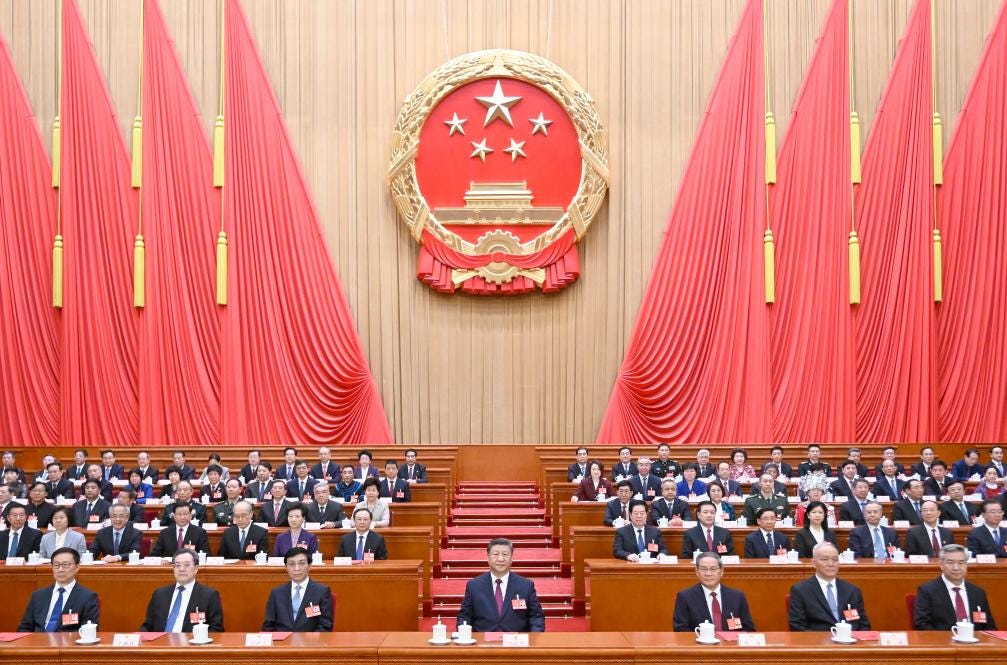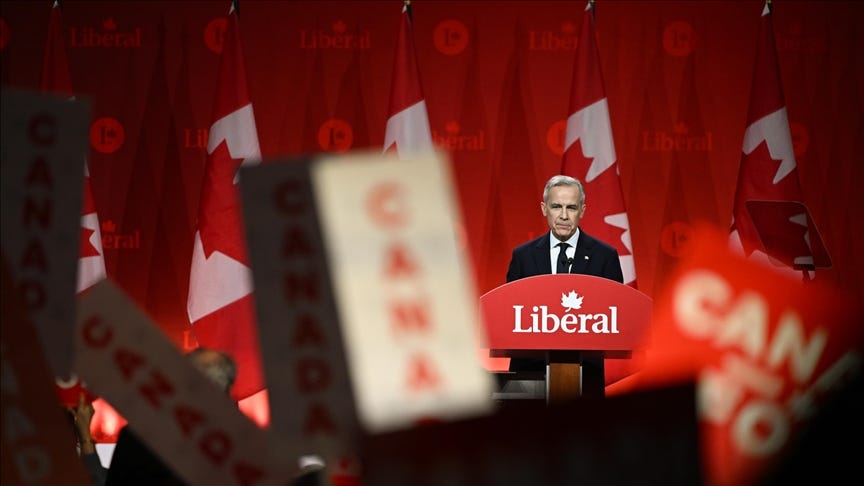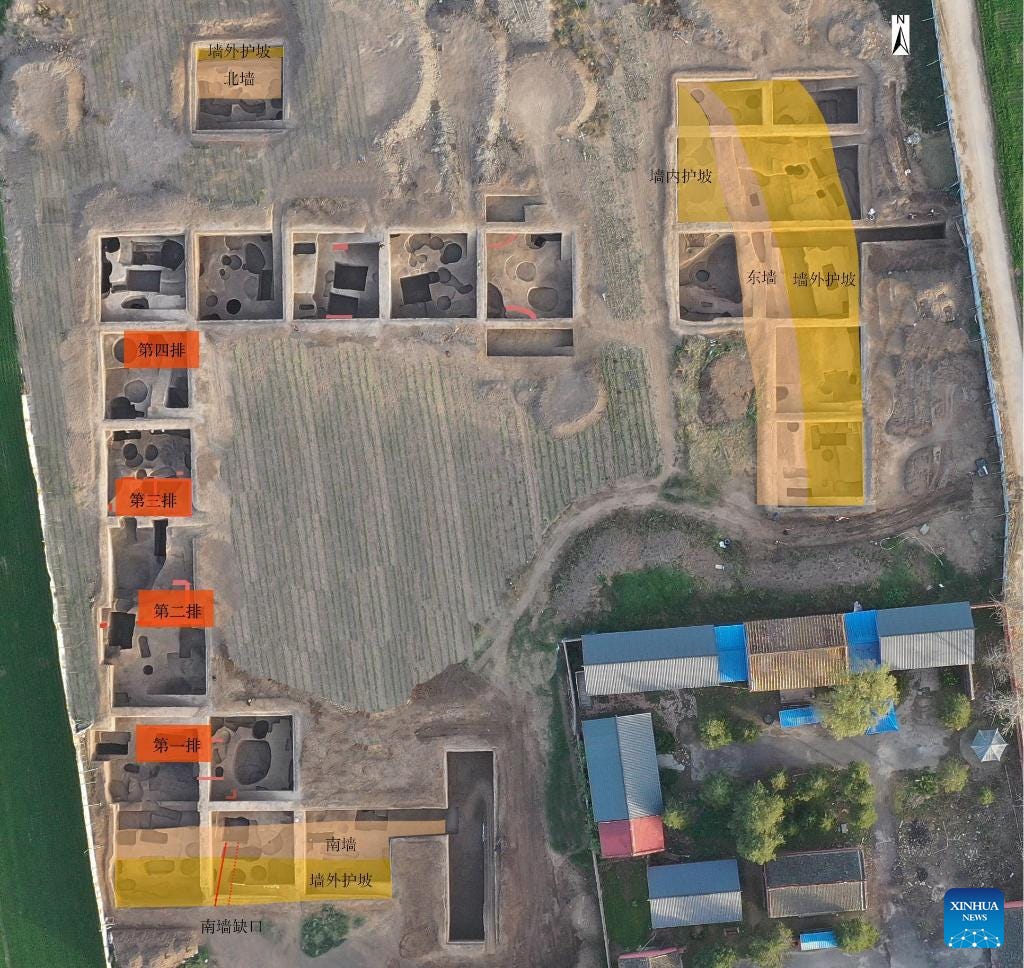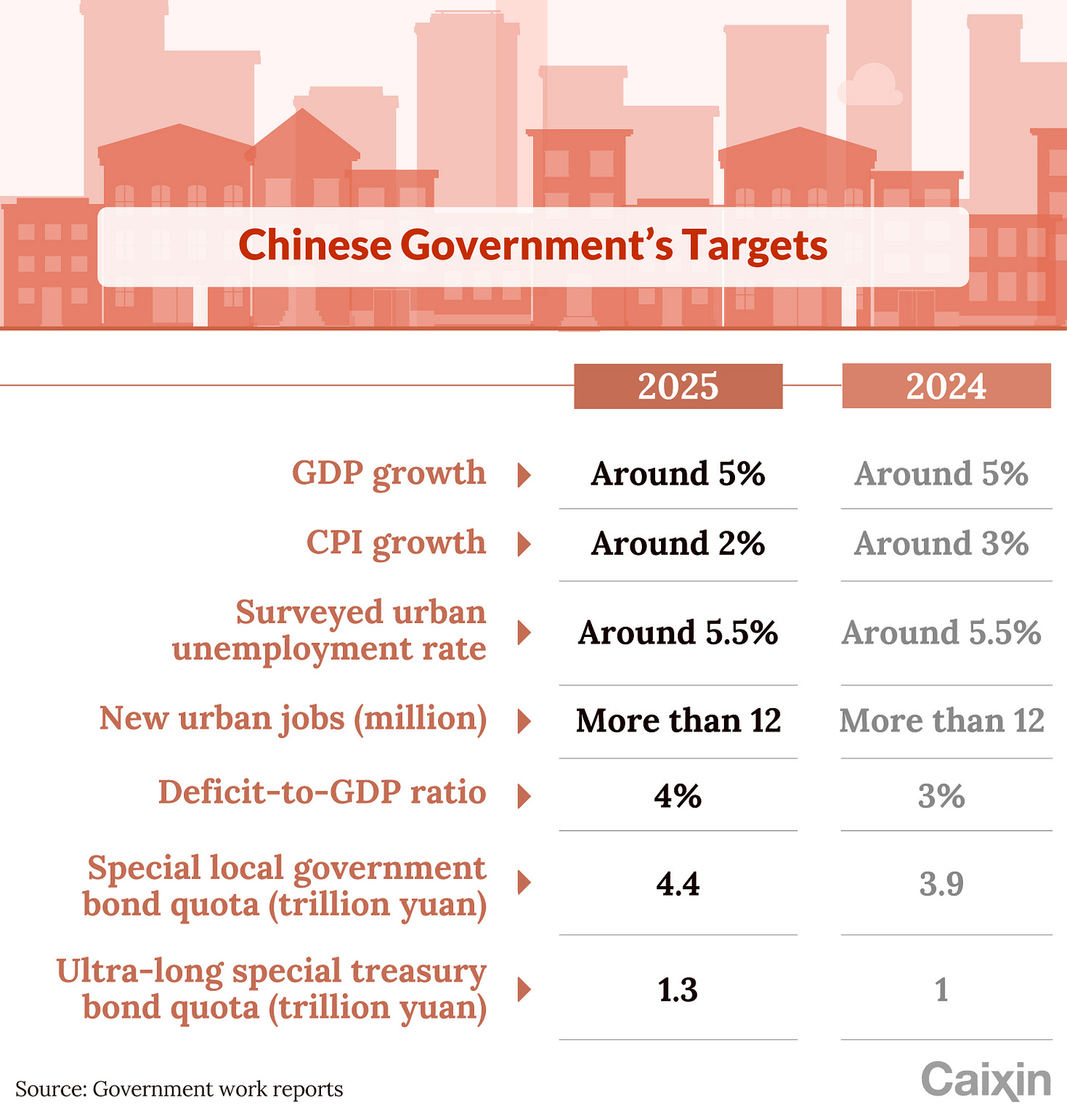China This Week: AI and Military Modernisation, Legal Warfare on Taiwan, and Nuclear Talks with Russia & Iran
Happy Holi! from Decypher. This week, China advances AI-driven military modernisation, escalates its legal warfare on Taiwan, and holds nuclear discussions with Russia and Iran.
China Quote 🗩
“We will establish a mechanism to increase funding for industries of the future and foster industries such as biomanufacturing, quantum technology, embodied AI, and 6G technology” Chinese Premier Li Qiang
AI and Military Modernisation – China’s Advantage
By Priyanka Garodia - Geopolitical Research Analyst
Artificial Intelligence (AI) is being included into modern military techniques increasingly. The latest development in China’s ‘Red Eye’ capacities that integrated AI in air combat, marking a shift in combat with human pilots becoming redundant.
China has been strengthening its military capacities over time with the inclusion of AI in weapons systems, cyber warfare and advancements in missile technology. This modernisation drive has been challenging security power structures in the Indo-Pacific increasingly. One of the most important consequences of this integration is the reconfiguration of global military capacities and by extension the security dynamic.
AI and Air Combat
China’s ‘Red Eye’ AI has been able to take down human pilots with the use of infrared imaging and artificial intelligence in strategic decision making during aerial combat. Once considered to be unmatched in decision-making and adaptation, human pilots can now be outrun both in speed and thinking. The AI technology developed can participate in combat manoeuvres while computing real-time battlefield data. The development has brought into question the future of aerial combat and the increasing reliance on automated weapons systems that seek to reduce human participation in warfare.
The development of China’s AI capacities is part of its larger military modernisation strategy to increase its military capabilities. The PLA has been using AI, drones, and cyber operations to prove its military edge in recent times. The development of AI-powered fighter jets has led to the future of areas like the Taiwan Strait and the South China Sea region coming into questions – leading to a higher security concern for the smaller island nations.
Combined with the development of its naval technology and its second-strike nuclear capabilities, this development has increased China’s first-strike capacities especially in the Western Pacific region. With its anti-ship missile capacities and cyber operations, China has a clear advantage in naval matters but now with the Red Eye tech being developed – an aerial advantage as well.
Global Security Measures
These advancements in military technology especially with the integration of AI into weapons systems has raised questions about the future of warfare. Powers like China and USA who have been investing heavily in developing military technology and engaging in an AI-driven arms race. The reduced role of human decision-making in warfare is a double-edged sword – while AI could help reduce scope for human error, it could also exacerbate the errors that come with machine thinking.
The development of China’s ‘Red-Eye’ technology and the progress made by the US army has led to major questions being raised about the lack of proper frameworks to regulate autonomous weapons. The US and China remain locked in an arms race and the future of global security does rest in these developments and its proliferation into the global landscape.
China’s Legal War for Taiwan: How Beijing is Preparing to Justify an Invasion
By Manashjyoti Karjee - Researcher -Security and Society
China is systematically crafting a legal framework to justify a potential invasion for Taiwan. Through a carefully structured legal campaign Beijing is attempting to reshape global perceptions, weaken Taiwan’s international standing and reduce the risk of international interventions. By embedding legal justifications within domestic legislation and international diplomatic efforts, China wants to establish a legal principle superiority that frames a potential military annexation of Taiwan as a lawful, internal matter.
Beijing’s approach is rooted in domestic legislation that provides legal cover for military legislation. The Anti-Secession Law (2005) authorises China to use “non-peaceful means” if it believes Taiwan is moving towards independence. This law has since been reinforced by the National Security Law (2015) and National Defense Law (2020) which expanded military action provisions to cover China’s claimed territories, including Taiwan. China has further strengthened its position through the Coast Guard Law (2021) and Maritime Traffic Safety Law (2021) granting the Chinese maritime forces sweeping powers to enforce Beijing’s jurisdiction over water it claims, including the Taiwan Strait. The National Intelligence Law (2018) complements these efforts by strengthening China’s ability to use foreign and domestic entities for intelligence gathering, raising concerns that Chinese firms operating abroad could be used to aid Beijing’s objectives.
China's lawfare also goes beyond changes in domestic law to diplomacy intended to gain international backing. A recent Lowy Institute report shows that almost half of UN member states now tacitly endorse China's sovereignty over Taiwan, most without clearly calling for peace as a prerequisite. This increased diplomatic support bolsters Beijing's legal case that Taiwan is an internal affair, subject to fewer international legal constraints on the use of force. China has realised these diplomatic achievements by coercing states and UN agencies into embracing its “One China” principle and stifling Taiwan's role in global governance.
As a step to further solidify its legal ground, China is likely to enhance diplomatic coercion, employing agreements with UN institutions to inscribe the ‘One China’ principle into international governance frameworks. Moreover, China is also likely to increase legal assertion in the Taiwan Strait by asserting jurisdiction over Taiwan's territorial waters through the drawing of straight baselines, reflecting past strategies for claiming the Paracels, Senkakus, and Scarborough Shoal. Should Beijing succeed, it would allow Beijing to place limitations on foreign military and commercial ships in Taiwan's surrounding waters, essentially creating an exclusion zone. A further move would be to propose a Taiwan Basic Law, patterned on Hong Kong's administration under Beijing. Such a law would both be used as propaganda and used as a legal cover for increased force against the leadership in Taiwan. In case Taiwan did not accept such a law, China would have evidence that peaceful actions had not succeeded, thereby prompting the Anti-Secession Law's provision to use force.
To counter China's lawfare, Taiwan and its allies have to deconstruct Beijing's legal justifications. One such step is to expose China's misinterpretation of UN Resolution 2758, which doesn’t explicitly mention Taiwan as a part of China. Also, in contradiction to China's claims, the Cairo and Potsdam Declarations do not bestow Communist China sovereignty over Taiwan since these agreements predate the establishment of the People’s Republic of China and have no binding authority over Taiwan’s current status.
To counter China’s legal maneuvers, strategic communications must clearly differentiate between national ‘One China’ policies, which acknowledge China’s claim without endorsement, and Beijing’s ‘One China’ principle, which demands Taiwan’s recognition as Chinese territory. Strengthening Taiwan’s legal standing globally is crucial, as China continues efforts to isolate it. U.S. bipartisan initiatives and broader international legal engagement should be expanded to prevent China’s claims from gaining legitimacy.
Military and legal deterrence must reinforce this strategy. Freedom of navigation operations (FONOPs) in the Taiwan Strait—conducted by the U.S., Japan, and other allies—should not only assert navigational rights but also legally challenge China’s maritime claims. Increased vigilance is necessary to track Beijing’s legal shifts, particularly changes in its national mobilisation framework, which may indicate military escalation. Taiwan’s legal and security experts should collaborate with allies to develop legal indicators for intelligence assessments.
China’s lawfare actively lowers the perceived cost of aggression, shaping the geopolitical environment to its advantage. Exposing these tactics and reinforcing Taiwan’s legitimacy are essential to deterring Beijing and maintaining stability in the Western Pacific.
Economic Activity🏦
‘Two sessions’ 2025: China portrays itself as stalwart of global order amid Trump tumult

Meredith Chen and Alyssa Chen write in SCMP that China is positioning itself as a defender of globalisation and stability amid escalating US-China tensions under President Trump. NPC spokesman Lou Qinjian emphasised China’s commitment to inclusive economic globalisation and multilateralism, countering Trump’s tariff hikes and suspension of Ukraine aid. Beijing has retaliated with tariffs on US goods and aims to deepen ties with Europe and the Global South. Economic stimulus and AI-driven growth are key focuses of China’s legislative meetings.
China’s 10-year bond yield eyes key 2% level as pressure mounts
Business Times reports that China’s 10-year government bond yield is nearing the critical 2% threshold, reflecting investor concerns over Beijing’s reluctance to introduce monetary easing. The yield hovered around 1.93% on Wednesday following a sell-off, driven by increased bond supply and a stock market rally. Analysts suggest long-term bonds may correct further as expectations of looser monetary policy fade. The finance ministry’s upcoming record 167 billion yuan issuance of two-year bonds on Friday will be a key test for the market.
Premier Li Qiang urges officials to expedite policy implementation amid economic uncertainties
Mandy Zuo reports in the SCMP that following the conclusion of China's "two sessions," Premier Li Qiang has called on government agencies to swiftly implement measures to achieve the nation's economic goals, including a 5% GDP growth target for 2025. Li emphasised the need for proactive action and interdepartmental coordination to address challenges such as weak domestic demand and escalating trade tensions with the United States. The State Council's recent work plan highlights priorities like expanding 5G applications, accelerating 6G development, and supporting private enterprises through substantial financing, reflecting a strategic focus on technological advancement and economic resilience.
Critical Mineral Prices Spike in China as Export Curbs Bite
Carol Yang writes in SCMP that the prices of strategic minerals in China have surged due to tightening export restrictions and geopolitical tensions. Antimony, used in microchips and weapons, has risen 21.8% domestically, while bismuth prices have nearly doubled since December. Cobalt prices have also spiked following an export freeze by the Democratic Republic of Congo. Analysts expect supply constraints to persist, exacerbating the global resource scramble between Beijing and Washington.
China’s Seven Titans vs Wall Street’s Magnificent Seven: DeepSeek sparks stocks re-rating
Zhang Shidong writes in SCMP that Hangzhou-based AI firm DeepSeek has triggered a major revaluation of Chinese tech stocks, leading to a surge in market confidence. The company’s low-cost large language model (LLM) debuted in January, quickly surpassing OpenAI’s ChatGPT in downloads. This development has fueled comparisons between China’s "Seven Titans"—Alibaba, Tencent, Xiaomi, BYD, SMIC, JD.com, and NetEase—and Wall Street’s "Magnificent Seven." Investment banks, including Goldman Sachs and Deutsche Bank, have upgraded their outlook on Chinese equities, with Goldman predicting a potential $200 billion inflow. DeepSeek’s rise is also reshaping China’s policy stance, with President Xi Jinping reaffirming support for the private sector.
Inside China🐉
China's unions say employers should not ask female job seekers about marital, childbearing status
Reuters reports that labour unions in China, including those in Hunan and Shenzhen, have issued directives barring companies from inquiring about the marital and childbearing status of female job applicants. The notices, widely circulated on social media, aim to curb gender discrimination in hiring practices. While some netizens welcomed the move, others expressed concerns that it might lead employers to avoid hiring women altogether. The initiative comes amid China's efforts to address gender inequality while encouraging higher birth rates.
Infection blamed for top Chinese lawmaker’s absence from key Parliament session
The Straits Times reports that Zhao Leji, China’s third-ranking Communist Party leader, was absent from a key parliamentary session due to a respiratory infection. His absence marks the first time in nearly two decades that a Politburo Standing Committee member has missed such a major event. The announcement of his illness was an unusual departure from the party’s secrecy regarding senior leaders’ health. While officials maintain that Zhao’s absence is health-related, past instances of unexplained absences among top officials have fueled speculation about internal political shifts.
Was sudden death of top Chinese materials scientist due to ‘insane’ workload?

Dannie Peng writes in SCMP that Zhejiang University professor Liu Yongfeng, a leading materials scientist, died at 47 after suffering a cerebral haemorrhage, raising concerns over extreme workloads in China’s research community. A social media post, purportedly by his wife, detailed his relentless work schedule, citing 319 working days in 10 months. Liu’s death adds to a growing list of premature fatalities among Chinese scientists, prompting calls for institutional reforms to protect researchers' health.
China and the World🌏
The railway that China hopes will take on the US in Africa
Monica Mark writes in the Financial Times that China is negotiating a $1bn concession to rehabilitate and operate Zambia's Tazara railway, originally built in the 1970s to connect Zambia to Tanzania's coast. Decades of underfunding have left the railway in disrepair. This move exemplifies China's shift towards leaner overseas development projects, focusing on infrastructure to bolster influence in Africa. Concurrently, a US-backed project aims to upgrade Zambia's western routes through Angola, highlighting the geopolitical competition for Africa's critical minerals. Local sentiments vary, with some workers expressing concerns over conditions in Chinese-operated mines.
Chinese Nationals Barred from Student Visas in New Proposal
Khaleda Rahman writes in Newsweek that U.S. Representative Riley Moore (R-WV) is introducing a bill to ban Chinese nationals from obtaining student visas. The Stop CCP VISAs Act aims to prevent espionage and intellectual property theft, citing national security concerns. Critics argue it promotes racial profiling and could harm U.S. universities and the economy by reducing international student enrolment. The bill has support from other Republican lawmakers but faces opposition from advocacy groups and Democratic lawmakers.
China, Russia, Iran to hold nuclear talks in Beijing on Friday
Reuters reports that China will host a trilateral meeting with Russia and Iran in Beijing on Friday to discuss Iran’s nuclear program. The meeting, chaired by China’s Vice Foreign Minister Ma Zhaoxu, follows heightened concerns over Iran’s uranium enrichment nearing weapons-grade levels. It coincides with a closed-door UN Security Council session on Iran’s nuclear expansion. Russia has also been engaging with Iran on nuclear discussions, while China continues to call for renewed negotiations on the 2015 nuclear deal, which unraveled after the U.S. withdrew in 2018.
China congratulates Carney for becoming leader of Canada's ruling party

Berk Kutay Gökmen writes in Anadolu Agency that China has congratulated Mark Carney on his election as leader of Canada’s ruling party, expressing hope for improved bilateral relations. Foreign Ministry spokeswoman Mao Ning urged Canada to adopt a "rational" and "pragmatic" approach towards China. The statement comes amid tensions over recent Chinese tariffs on Canadian agricultural products, imposed in response to levies introduced by Ottawa in late 2024. Beijing insists its measures are "necessary, justified, and lawful," calling on Canada to rectify its trade policies.
Secret negotiations between DGSI, Chinese intelligence and French foreign ministry
Antoine Izambard writes in Intelligence Online that France and China are engaged in tense negotiations after Beijing attempted to forcibly repatriate a Chinese national from Paris-Charles de Gaulle Airport in March 2024. France’s intelligence agency DGSI and the foreign ministry requested China to recall three of its officials over the incident, but Beijing has refused. The dispute remains unresolved, complicating diplomatic relations amid broader tensions between the two nations.
Iran, China and Russia launch annual joint naval drills
Zac Crellin writes in Deutsche Welle that Iran, China, and Russia have commenced their annual Marine Security Belt naval exercises near the Gulf of Oman. The drills, aimed at enhancing regional security and multilateral military cooperation, involve warships from all three nations. Russia has deployed two corvettes and a tanker, while China sent a destroyer and a supply ship. Iran has contributed ten vessels from its navy and the Revolutionary Guard. The exercises will focus on ship rescue operations, counter-piracy drills, and live-fire exercises in the strategically significant waters leading to the Strait of Hormuz.
Iran Using Panama Courts to Reclaim Tankers for Its Ghost Fleet
Intelligence Online reports that several Hong Kong-based shell companies linked to Iran’s state shipping company are attempting to reclaim three vessels through Panama’s legal system. These tankers, suspected of being part of Iran’s "ghost fleet" used to bypass sanctions, were previously seized under accusations of illegal oil transfers. The legal maneuvering highlights Iran’s continued efforts to maintain access to maritime routes despite U.S. and international restrictions.
Facebook Was 'Hand in Glove' with China, BBC Told
Katie Razzall and Sarah Bell write in BBC News that former Facebook executive Sarah Wynn-Williams alleges the company worked closely with the Chinese government on censorship tools in hopes of entering the Chinese market. She claims Mark Zuckerberg was willing to allow viral posts to be hidden until vetted by Chinese authorities. Wynn-Williams also filed an SEC whistleblower complaint, accusing Meta of misleading investors about its China dealings. Meta dismissed her claims, citing her termination for "poor performance." The company denies working with China on censorship and has sued to block the publication of her memoir.
Missouri plans to seize assets to make China pay a $24.5 billion judgment, but can it collect?

John Hanna and Summer Ballentine write in Associated Press that Missouri Attorney General Andrew Bailey is threatening to seize Chinese-owned assets across the U.S. to enforce a $24.5 billion judgment against China over alleged COVID-19 mismanagement. The ruling, issued by a U.S. federal judge, claims China hoarded personal protective equipment, harming Missouri residents. However, legal experts doubt the feasibility of collecting the funds, as China rejects the verdict, calling it “absurd” and outside U.S. jurisdiction. Critics argue the move is largely symbolic and could strain U.S.-China relations.
Walmart Clashes with China After Asking Suppliers to Absorb Tariffs
Nathan Bomey writes in Axios that Walmart is under pressure from China after asking local suppliers to absorb increased tariffs imposed by President Trump. Chinese officials criticised the retailer for its demands, warning of potential repercussions. While Walmart relies on China for a significant portion of its supply chain, it has also invested in diversifying its sourcing. The company’s negotiations reflect broader tensions in the ongoing U.S.-China trade war, which risks increasing consumer prices despite Trump’s promises to curb inflation.
Dalai Lama says his successor will be born outside China in the ‘free world’
The Guardian reports that the Dalai Lama, in his new book Voice for the Voiceless, has declared that his reincarnation will take place outside China, ensuring the continuation of Tibetan Buddhism free from Beijing’s influence. This marks a significant escalation in the ongoing dispute over his succession, as China insists it will control the selection process. The Tibetan spiritual leader, who has lived in exile in India since 1959, reaffirmed that any successor chosen by Beijing will not be recognised. China dismissed his remarks as separatist rhetoric, maintaining its claim over Tibet.
Tech in China🖥️
Manus partners with Alibaba's Qwen to advance AI integration
Fan Feifei writes in China Daily that Chinese AI agent Manus has announced a strategic partnership with Alibaba’s Qwen team to enhance AI integration using homegrown models and computing platforms. The collaboration focuses on open-source AI development, with Manus leveraging Alibaba’s latest large language model, QwQ-32B, to expand capabilities beyond chatbot functions. The partnership aims to advance AI-driven applications for Chinese users, enabling Manus to perform complex tasks such as resume screening, stock analysis, and website creation.
Biren secures pre-IPO funding as valuation tops US$2.1B, backed by Shanghai AI Industry Fund
Levi Li reports in DIGITIMES that Shanghai-based GPU startup Biren Technology has secured pre-IPO funding, elevating its valuation to over US$2.1 billion. The investment round was led by the Shanghai AI Industry Fund, with participation from several leading institutional investors. This funding positions Biren for its upcoming initial public offering, reflecting strong investor confidence in its potential within China's burgeoning AI and semiconductor sectors.
De/Cypher Data Dive 📊
China’s criminal acquittal rate remains exceptionally low. In 2024, only 418 individuals were acquitted or found not criminally liable in public prosecution cases, accounting for 0.03% of all criminal cases.
Image of the Week📸
Ancient City Walls from Early Xia Dynasty Unearthed in China

Xinhua reports that archaeologists have discovered ancient city walls in Henan Province, dating back to the early Xia Dynasty (2070-1600 B.C.). The Liuzhuang relic site, spanning 80,000 square meters, features a rectangular city layout with four rammed earth walls. Carbon-14 dating confirms the structures' timeline, offering new insights into early Chinese urban development and settlement patterns.
- - -




